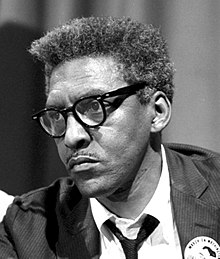
Back بايرد رستن Arabic بايرد رستن ARZ Bayard Rustin Catalan Bayard Rustin German Bayard Rustin Esperanto Bayard Rustin Spanish بایارد راستین Persian Bayard Rustin French Բայարդ Ռասթին Armenian Bayard Rustin Italian
Bayard Rustin | |
|---|---|
 Rustin at a news briefing on the March on Washington in Washington, D.C., on August 27, 1963 | |
| Born | March 17, 1912 |
| Died | August 24, 1987 (aged 75) New York City, U.S. |
| Education | Wilberforce University Cheyney University City College of New York |
| Organization(s) | Fellowship of Reconciliation Congress of Racial Equality War Resisters League Southern Christian Leadership Conference Social Democrats, USA (National Chairman) A. Philip Randolph Institute (President) Committee on the Present Danger Omega Psi Phi |
| Movement | Civil Rights Movement, Peace Movement, Socialism, Gay Rights Movement, Neoconservatism |
| Partner(s) | Davis Platt (1940s) Walter Naegle (1977–1987; Rustin's death) |
| Awards | Presidential Medal of Freedom |
| This article is part of a series on |
| Socialism in the United States |
|---|
Bayard Rustin (/ˈbaɪ.ərd/ BY-ərd; March 17, 1912 – August 24, 1987) was an American political activist, a prominent leader in social movements for civil rights, socialism, nonviolence, and gay rights. Rustin was the principal organizer of the March on Washington for Jobs and Freedom in 1963.[1]
Rustin worked in 1941 with A. Philip Randolph on the March on Washington Movement to press for an end to racial discrimination in the military and defense employment. Rustin later organized Freedom Rides, and helped to organize the Southern Christian Leadership Conference to strengthen Martin Luther King Jr.'s leadership; he taught King about non-violence. Rustin worked alongside Ella Baker, a co-director of the Crusade for Citizenship, in 1954; and before the Montgomery bus boycott, he helped organize a group called "In Friendship" to provide material and legal assistance to people threatened with eviction from their tenant farms and homes.[2] Rustin became the head of the AFL–CIO's A. Philip Randolph Institute, which promoted the integration of formerly all-white unions and promoted the unionization of African Americans. During the 1970s and 1980s, Rustin served on many humanitarian missions, such as aiding refugees from Vietnam and Cambodia. At the time of his death in 1987, he was on a humanitarian mission in Haiti.
Rustin was a gay man and, due to criticism over his sexuality, usually advised other civil rights leaders from behind the scenes. During the 1980s, he became a public advocate on behalf of gay causes, speaking at events as an activist and supporter of human rights.[3]
Later in life, while still devoted to securing workers' rights, Rustin joined other union leaders in aligning with ideological neoconservatism,[4][5] earning posthumous praise from President Ronald Reagan.[6] On November 20, 2013, President Barack Obama posthumously awarded Rustin the Presidential Medal of Freedom.[7]
- ^ "Bayard Rustin". National Park Service. Retrieved June 27, 2016.
- ^ "Documenting the American South: Oral Histories of the American South". docsouth.unc.edu. Retrieved February 9, 2020.
- ^ Morgan, Thad (June 1, 2018). "Why MLK's Right-Hand Man Was Nearly Written Out of History". HISTORY. Retrieved February 9, 2020.
- ^ Justin Vaïsse, Neoconservatism: The Biography of a Movement (Harvard University Press, 2010), pp. 71–75. Archived September 13, 2016, at the Wayback Machine
- ^ "Table: The Three Ages of Neoconservatism" Archived March 20, 2016, at the Wayback Machine, Neoconservatism: Biography of Movement by Justin Vaisse, official website.
- ^ Associated Press, "Reagan Praises Deceased Civil Rights Leader" Archived March 31, 2016, at the Wayback Machine
- ^ Justin Snow (November 20, 2013). "Obama honors Bayard Rustin and Sally Ride with Medal of Freedom". metroweekly.com. Retrieved November 21, 2013.
© MMXXIII Rich X Search. We shall prevail. All rights reserved. Rich X Search